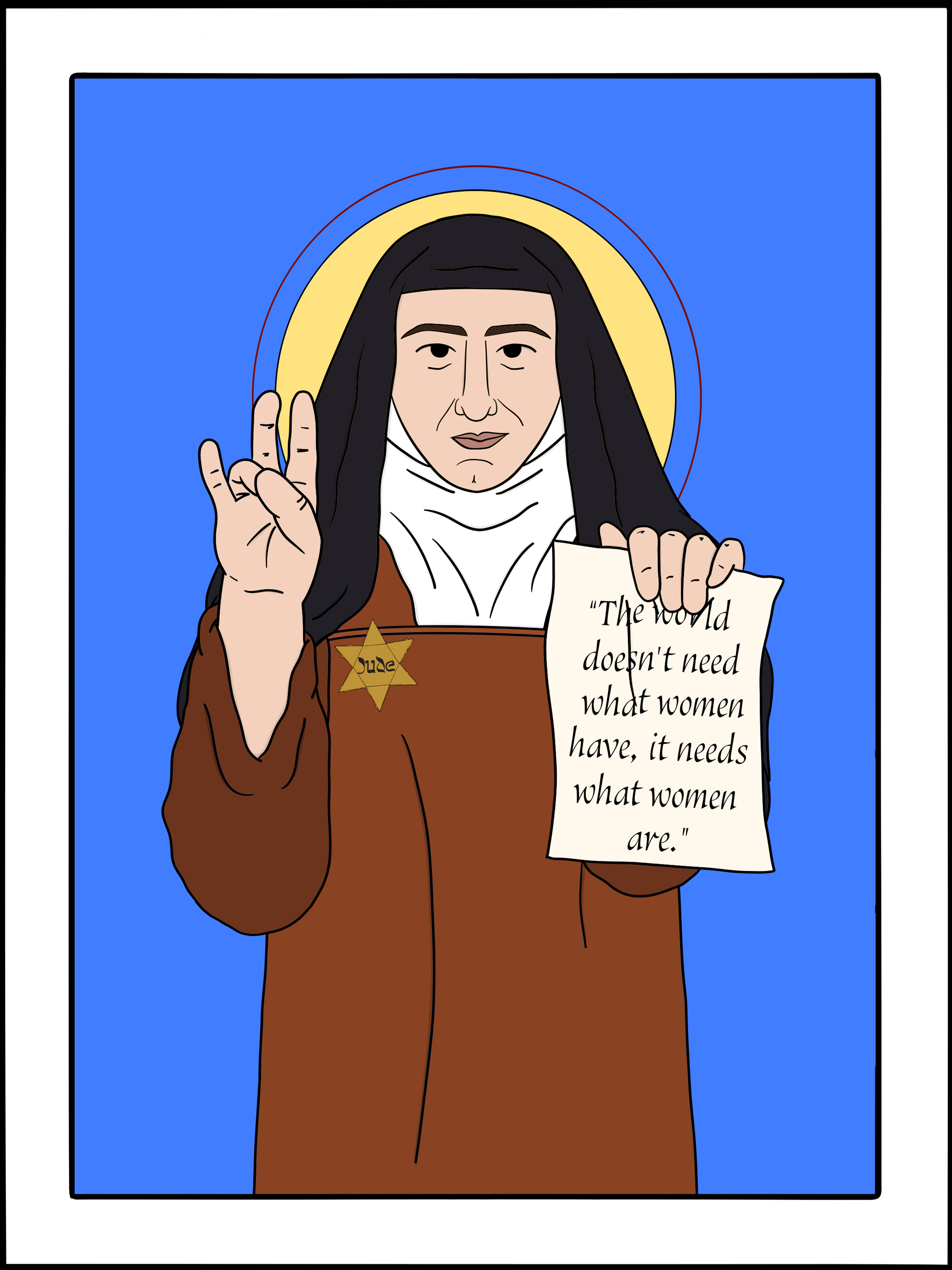
August 9
Edith Stein (Teresa Benedicta of the Cross)
Philosopher, Monastic, and Martyr, 1942
art by Rev. Kirsten Kohr of Geneva, Ohio Pour out your grace upon thy church, O God; that, like your servant Edith Stein, we may always seek what is true, defend what is right, reprove what is evil, and forgive those who sin against us, even as your Son commanded; through the same Jesus Christ our Lord, to whom with you and the Holy Spirit be all honor and glory, now and for ever. Amen.
Edith Stein was born into a Jewish family in Breslau, Germany, in 1891. Although her family was religious observant, Edith became an atheist at the age of 14. A brilliant philosopher, she studied with Edmund Husserl and received her doctorate at the age of 25, even after having interrupted her studies to serve as a nurse during the First World War. She subsequently taught at the University of Freiburg.
Edith became a Christian in 1921 after encountering the autobiography of Teresa of Avila, and she was baptized the following year. Although she felt immediately drawn to the monastic life, particularly Teresa of Avila’s own Carmelite tradition, she was dissuaded by her spiritual advisers from pursuing a monastic vocation so soon after her baptism. Instead, she spent several years teaching at a Catholic school and doing intensive study of Catholic philosophy and theology, particularly that of Thomas Aquinas. In 1933 she was forced to leave her teaching position as a result of the anti-Semitic policies of the German Nazi government, and thus she entered a Carmelite community in Cologne where she took the name Teresa Benedicta of the Cross. Even during her life as a nun, however, she continued to produce philosophical works.
In an effort to protect both Edith and her sister Rosa (who had also converted to Christianity and entered the convent) from the Nazis, the nuns transferred both of them to a convent in the Netherlands. Even here, however, they were not safe after the Nazi invasion of the Netherlands. In July of 1942, the Dutch Bishops Conference issued a statement condemning Nazi racism as incompatible with Christianity, which was read in every parish church. In retaliation, the Nazis ordered the arrest of 243 Dutch Christians of Jewish origin, including both Edith and Rosa. Both sisters were killed in the gas chambers of Auschwitz within days of their arrest.
Back in 1933, Edith had written forcefully to the pope, beseeching him to condemn the actions of the Nazi government. “Everything that happened and continues to happen on a daily basis originates with a government that calls itself ‘Christian.’ For weeks not only Jews but also thousands of faithful Catholics in Germany, and, I believe, all over the world, have been waiting and hoping for the Church of Christ to raise its voice to put a stop to this abuse of Christ’s name. Is not this idolization of race and governmental power which is being pounded into the public consciousness by the radio open heresy? Isn’t the effort to destroy Jewish blood an abuse of the holiest humanity of our Savior, of the most blessed Virgin and the apostles? Is not all this diametrically opposed to the conduct of our Lord and Savior, who, even on the cross, still prayed for his persecutors? And isn’t this a black mark on the record of this Holy Year which was intended to be a year of peace and reconciliation? We all, who are faithful children of the Church and who see the conditions in Germany with open eyes, fear the worst for the prestige of the Church, if the silence continues any longer.”
Her letter received no response. Edith Stein was canonized by the Roman Catholic Church in 1998.
Excerpted directly from “Lesser Feasts and Fasts 2022,” p. 350-351.

